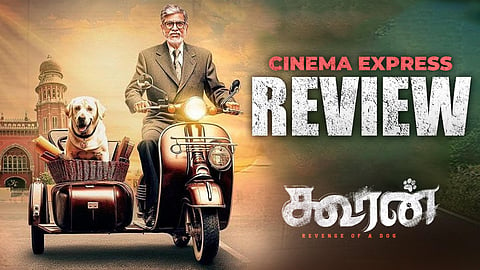Kooran Movie Review: This laws and paws film is clumsily executed
Kooran Movie Review(1.5 / 5)
The legend goes that Tamil king Manuneedhi Chozhan installed a bell outside his court for people seeking justice. One day, a cow rang the bell to demand justice for its slain calf, which had been run over by the chariot of the king's son. The king, staying true to his principles, executed his own son in the same manner to uphold justice. Kooran follows a similar premise, and given that it is inspired by a well-known legend, the least it demanded was a decent—if not brilliant—execution. Unfortunately, that was not the case.
The film begins with a puppy being hit by a car, prompting its mother to run to a police station for help. The scene catches the attention of retired advocate Dharmaraj (SA Chandrasekhar), and the canine begins following him. Soon after, Dharmaraj discovers the reason for the dog’s restlessness: the hit-and-run was committed by Ranjith Raja, son of influential businessman Sekhar Raja. The film then explores whether the spirit of justice upheld by Manuneedhi Chozhan still exists today.
Kooran’s biggest flaw lies in its misjudgment of its own strengths. The film should have explored how a dog, while staying true to its nature, could navigate a justice system created by and for humans. Instead, director Nithin Vemupati takes the easy way out by making the dog perform human actions, undermining the film’s core idea. What could have been an intriguing premise turns into a far-fetched narrative, where cinematic liberties become more of a hindrance than an asset. A particularly unwise choice was endowing the dog—trained in a police sniffer squad—not just with tracking abilities but also the ability to detect colours (which dogs can’t see) and numbers.
The performances and dialogues do little to salvage this rudderless narrative. Take, for instance, the antagonist Ranjith Raja (played by Nithin Vemupati himself), who caricatures his role to the point where he stops being a credible threat to Dharmaraj’s pursuit of justice. The plot fully develops within the first 25 minutes, leaving the rest of the runtime devoid of compelling character arcs or engaging developments. In films like these, strong character arcs are crucial, but Kooran offers none.
Director: Nithin Vemupati
Cast: SA Chandrasekhar, YG Mahendran, Nithin Vemupati, Indhuja Shankar
Comparisons to actor-director SA Chandrasekhar’s courtroom dramas are inevitable, given his reputation for commercial films revolving around legal battles. Kooran borrows his trademark style of jumping straight into the plot, but it lacks the narrative grip that made his works effective. Typically, in SAC’s films, the hero and villain clash both inside and outside the courtroom, with both conflicts progressing in tandem. Here, however, the courtroom drama is the weakest of all recent entries in the genre. Adjournments occur frequently, but not a single one ends at a critical juncture that builds tension or drives the story forward. The courtroom scenes are unintentionally funny, with awkwardly written arguments and absurd interruptions. The court audience constantly makes comments aimed at the judge, lawyer, or defendant—yet not once does the judge intervene with the usual "Order! Order! Order!"
To make matters worse, the film includes a flashback explaining how Jhansi/Bairava (the dog) acquired its special abilities. These portions are visually subpar, and even with the backstory, the dog’s abilities remain inexplicable—no amount of police training can override the fundamental limitations of a canine. What was meant to provide a break from the courtroom drama only makes us impatient to return to the trial. Toward the climax, Dharmaraj faces a roadblock in the case, only to be rescued by yet another implausible miracle. The screenplay stretches this revelation unnecessarily, even though another eyewitness—who conveniently withheld the same information earlier—could have resolved the conflict much sooner.
Kooran serves as a reminder that a good idea does not automatically translate into a good film—especially not through the over-the-top storytelling it relies on. The film aims to promote compassion toward animals but its execution betrays its noble intentions. Rather than respecting the natural abilities and limitations of a dog and crafting a story around them, the filmmakers choose to grant it superpowers more fitting for an MCU character. In doing so, they dilute the very cause they set out to champion.

